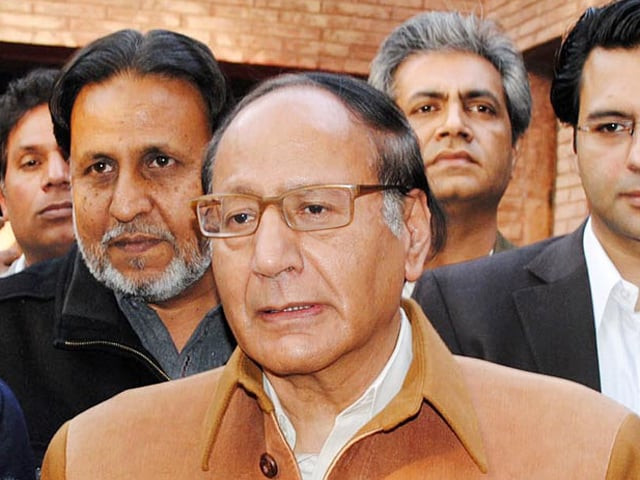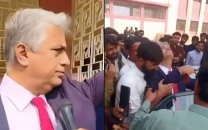Salvaging coalition: Shujaat swings into action
PML-Q leader calls upon MQM chief in London, Altaf invites Shujaat to join party on opposition benches.

The MQM’s decision to quit the government has sparked a flurry of activities simultaneously in Islamabad, Karachi and London.
With MQM’s departure, the limelight falls squarely on the government’s other major ally – the Pakistan Muslim League-Quaid (PML-Q) – whose support to the PPP–led coalition is now extremely pivotal. PML-Q leader Chaudhry Shujaat Hussain swung into action immediately and called up MQM chief Altaf Hussain in London.
Sources said the MQM leader highlighted the long-standing partnership between the PML-Q and his party – both were partners in the government during General Musharraf’s rule – and invited Shujaat to join him on the opposition benches.
While joining the PPP-led government earlier in May, the PML-Q had sought the inclusion of the MQM as an insurance against the prospects of being ousted from the coalition due to its trust deficit with the PPP.
Sources add that Chaudhry Shujaat sought time from the MQM leader to arrive at a decision and subsequently met Prime Minister Yousaf Raza Gilani at the Prime Minister House in Islamabad. According to APP, the PML-Q leader assured Gilani “of his party’s complete support in future political and economic policies,” but no such announcement has been made by the PML-Q.
Coalition safe, says opposition
The opposition says MQM’s quitting poses no threat to the PPP-led government due to the presence of PML-Q as an ally.
“The future of the coalition government is stable,” PML-Nawaz (PML-N) leader Engineer Khurram Dastgir told The Express Tribune. After the inclusion of PML-Q in the ruling coalition, the government at this juncture is not facing any threat of destabilisation, he said.
Commenting on the cause of disagreement between the coalition partners – the postponement of elections in Karachi for Azad Jammu and Kashmir (AJK) Legislative Assembly – Dastgir censured gerrymandering tactics and said “their desire to run away from free and fair elections reflects a weak commitment to democracy. “The split has nothing to do with welfare of the people.”
Former interior minister Aftab Ahmed Khan Sherpao said he “welcomed the decision of the MQM to sit on opposition benches since it would strengthen the opposition.” He added, though, that the government was not in danger due to the presence of PML-Q. “Perhaps this is the reason that President Asif Ali Zardari did not bother to pay heed to MQM’s demands,” he said.
Sherpao also added that the MQM had taken the decision after a realisation that the PPP was getting unpopular and it was time to quit and save its own credibility.
Senator Professor Khursheed Ahmed of the Jamaat-e-Islami (JI) also said the government was in no danger since it had the PML-Q’s support.
Wooing ‘estranged friends’
Efforts to lure the MQM back into the government also appeared on the horizon with Sindh Chief Minister Qaim Ali Shah saying that the MQM’s grievances will be addressed through reconciliation. President Zardari believes in politics of reconciliation and we’re trying to woo back our estranged friends, he said.
Shah added that they are also in contact with Sindh Governor Dr Isratul Ebad.
Federal law minister Maula Baksh Chandio, while speaking to the media, said that disagreements with the MQM are a regular occurrence and expressed hope that the issue will be resolved soon.
Published in The Express Tribune, June 28th, 2011.



















COMMENTS
Comments are moderated and generally will be posted if they are on-topic and not abusive.
For more information, please see our Comments FAQ